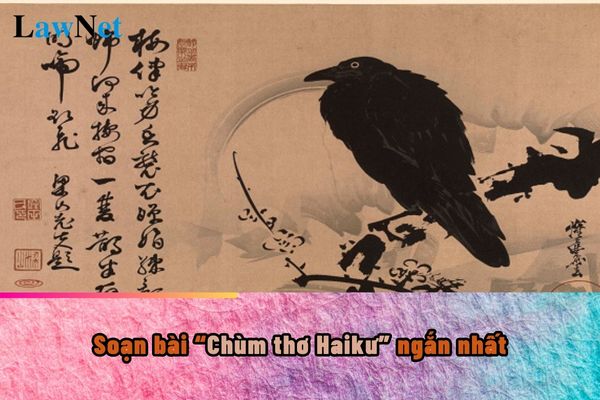What are guidelines on preparing the lesson "Haiku Poems" for students in Vietnam? Do grade 10 students in Vietnam have the right to receive scholarships?
What are guidelines on preparing the lesson "Haiku Poems" for students in Vietnam?
The collection of Haiku poems by Basho is one of the texts that students will study in the grade 10 Literature program.
Students can refer to the following guidelines on preparing the lesson "Haiku Poems":
|
Preparation Haiku Poem Collection *Overview of Haiku |
*Note: The above information is for reference only./.
What are subjects in grade 10 curriculum in the school year 2024-2025 in Vietnam?
Based on Section 4 of the General Education Program issued with Circular 32/2018/TT-BGDDT (amended by Article 1 Circular 13/2022/TT-BGDDT) regarding the educational plan:
EDUCATIONAL PLAN
The general education program is divided into two phases: the basic education phase (from grade 1 to grade 9) and the career-oriented education phase (from grade 10 to grade 12).
The system of subjects and educational activities in the general education program includes compulsory subjects and educational activities, elective subjects oriented towards careers (referred to as elective subjects), and optional subjects.
The official learning time in an academic year is equivalent to 35 weeks. Educational institutions may organize teaching either one session/day or two sessions/day. Institutions teaching one session/day and two sessions/day must implement the same mandatory educational content uniformly across all institutions nationwide.
When entering grade 10, students will prepare for the career-oriented education phase, thus they will choose the following subjects:
*Career-Oriented Phase
- Compulsory subjects and educational activities: Literature; Math; Foreign Language 1; History; Physical Education; Defense and Security Education; Experiential Activities, Career Orientation; Local Educational Content.
- Elective subjects: Geography, Economic and Legal Education, Physics, Chemistry, Biology, Technology, Informatics, Music, Art.
- Students choose 4 subjects from the elective subjects.
- Study Modules: Each subject of Literature, Math, History, Geography, Economic and Legal Education, Physics, Chemistry, Biology, Technology, Informatics, Music, and Art has several study modules forming a module cluster aiming for profound differentiation, helping students enhance knowledge and practical skills, apply learned knowledge and skills to solve real-life issues, meeting career orientation requirements. Each study module is allocated 10 or 15 periods; the entire module cluster of a subject is allotted 35 periods per academic year.
In each of grades 10, 11, 12, students choose 3 module clusters from 3 subjects according to their preferences and the school's organizational capacity.
- Schools can create subject combinations from the subjects and study modules mentioned above to meet learners' needs while ensuring alignment with the school's teaching staff conditions, facilities, and teaching equipment.
Elective subjects: Ethnic Minority Language, Foreign Language 2.

What are guidelines on preparing the lesson "Haiku Poems" for students in Vietnam? Do grade 10 students in Vietnam have the right to receive scholarships? - (Image from the Internet)
Do grade 10 students in Vietnam have the right to receive scholarships?
The rights of grade 10 students are defined specifically in Article 35 of the regulations issued with Circular 32/2020/TT-BGDDT:
- To be equal in enjoying comprehensive education, guaranteed conditions in terms of time, physical facilities, hygiene, and safety to study in class and self-study at home, provided information about their learning and training, and allowed to use equipment and facilities for learning, cultural, and sports activities of the school in accordance with the regulations.
- To be respected and protected, to be treated equally and democratically, to have the right to appeal to the school and educational management levels regarding decisions affecting themselves; to have the right to transfer schools for justifiable reasons under current regulations; to study ahead of age, skip grades, or study at an older age than prescribed according to Article 33 of the regulations issued with Circular 32/2020/TT-BGDDT.
- To participate in activities to develop talents in subjects, sports, and arts organized by the school if eligible.
- To receive scholarships or other assistance as regulated for students eligible for social policies, those in difficult living conditions, and those with special abilities.
- To transfer schools if eligible according to regulations; the transfer procedures follow the regulations of the Minister of Education and Training.
- To enjoy other rights as prescribed by law.
Thus, grade 10 students have the right to receive scholarships.

